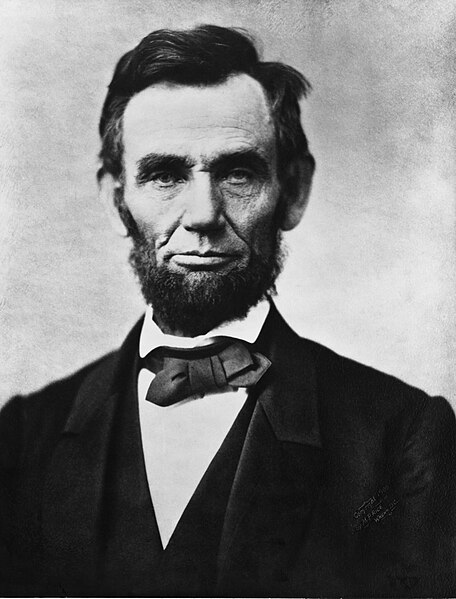
Four score and seven years ago our fathers brought forth on this continent, a new nation, conceived in Liberty, and dedicated to the proposition that all men are created equal.
Now we are engaged in a great civil war, testing whether that nation, or any nation so conceived and so dedicated, can long endure. We are met on a great battle-field of that war. We have come to dedicate a portion of that field, as a final resting place for those who here gave their lives that that nation might live. It is altogether fitting and proper that we should do this.
But, in a larger sense, we can not dedicate — we can not consecrate — we can not hallow — this ground. The brave men, living and dead, who truggled here, have consecrated it, far above our poor power to add or detract. The world will little note, nor long remember what we say here, but it can never forget what they did here. It is for us the living, rather, to be dedicated here to the unfinished work which they who fought here have thus far so nobly advanced.
It is rather for us to be here dedicated to the great task remaining before us — that from these honored dead we take increased devotion to that cause for which they gave the last full measure of devotion — that we here highly resolve that these dead shall not have died in vain — that this nation, under God, shall have a new birth of freedom — and that government of the people, by the people, for the people, shall not perish from the earth.
46,286 casualties were incurred from July 1 to July 3, 1863, in and around Gettysburg, Pennsylvania. 7,863 soldiers were confirmed killed, and 27,224 were wounded. Of the wounded, more than one in three would later die of their wounds and the appalling medical treatment available for them. 11,199 were captured by the opposing sides or went missing altogether; of the captured, the survival rate was about 50%.
Just by way of comparison so as to understand exactly how terrible the Battle of Gettysburg was, in Iraq since the invasion in 2003, the U.S. has sustained 4,203 deaths to date (the total rises to 4,515 if allied forces are included) and 30,832 wounded, with one missing soldier. Survival rates for wounded soldiers are substantially higher today than theywere in 1863; 56% of wounded soldiers are well enough to return to duty within 72 hours of their injury.
This cost of war, measured in blood, is very high. It also has been paid out over five years, and the totals are yet smaller than three days' fighting in Gettysburg. Gettyburg's totals are so high, of course, because it was Americans killing other Americans.
Gratefully, we shed less blood in our struggles to conform our society to our ideals than we did in Lincoln's day. But the task set in motion by the Founding Fathers, and so nobly described by Lincoln seven score and five years ago today, is yet incomplete.







No comments:
Post a Comment